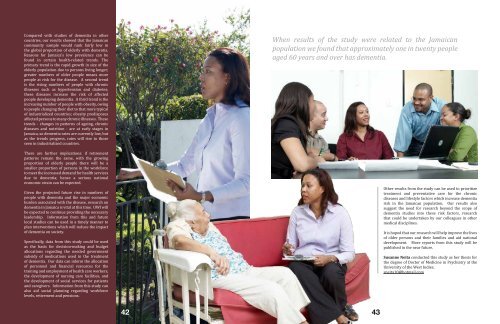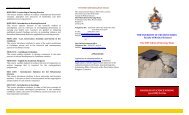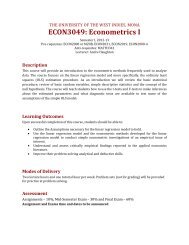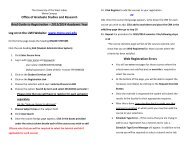Download Pdf - Uwi.edu
Download Pdf - Uwi.edu
Download Pdf - Uwi.edu
- No tags were found...
You also want an ePaper? Increase the reach of your titles
YUMPU automatically turns print PDFs into web optimized ePapers that Google loves.
Compared with studies of dementia in othercountries, our results showed that the Jamaicancommunity sample would rank fairly low inthe global proportion of elderly with dementia.Reasons for Jamaica’s low prevalence can befound in certain health-related trends. Theprimary trend is the rapid growth in size of theelderly population due to persons living longer;greater numbers of older people means morepeople at risk for the disease. A second trendis the rising numbers of people with chronicillnesses such as hypertension and diabetes;these diseases increase the risk of affectedpeople developing dementia. A third trend is theincreasing number of people with obesity, owingto people changing their diet to that more typicalof industrialized countries; obesity predisposesaffected persons to many chronic illnesses. Thesetrends - changes in patterns of ageing, chronicdiseases and nutrition - are at early stages inJamaica, so dementia rates are currently low, butas the trends progress, rates will rise to thoseseen in industrialized countries.There are further implications: if retirementpatterns remain the same, with the growingproportion of elderly people there will be asmaller proportion of persons in the workforceto meet the increased demand for health servicesdue to dementia; hence a serious nationaleconomic strain can be expected.Given the projected future rise in numbers ofpeople with dementia and the major economicburden associated with the disease, research ondementia in Jamaica is vital at this time. UWI willbe expected to continue providing the necessaryleadership. Information from this and futurelocal studies can be used in a timely manner toplan interventions which will r<strong>edu</strong>ce the impactof dementia on society.Specifically, data from this study could be usedas the basis for decision-making and budgetallocations regarding the needed governmentsubsidy of medications used in the treatmentof dementia. Our data can inform the allocationof personnel and financial resources for thetraining and employment of health care workers,the development of nursing care facilities, andthe development of social services for patientsand caregivers. Information from this study canalso aid social planning regarding workforcelevels, retirement and pensions.When results of the study were related to the Jamaicanpopulation we found that approximately one in twenty peopleaged 60 years and over has dementia.Other results from the study can be used to prioritizetreatment and preventative care for the chronicdiseases and lifestyle factors which increase dementiarisk in the Jamaican population. Our results alsosuggest the need for research beyond the scope ofdementia studies into these risk factors, researchthat could be undertaken by our colleagues in othermedical disciplines.It is hoped that our research will help improve the livesof older persons and their families and aid nationaldevelopment. More reports from this study will bepublished in the near future.Susanne Neita conducted this study as her thesis forthe degree of Doctor of Medicine in Psychiatry at theUniversity of the West Indies.sneita10@hotmail.com42 43

















